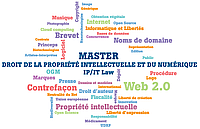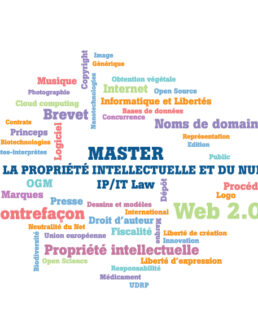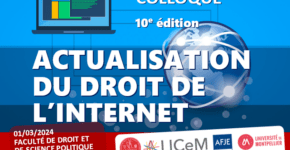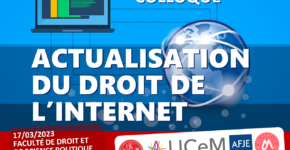
"However terrible life may be, the existence of creative activity with no other purpose than itself is enough to justify it. Play, of course, seems at first sight to be the least useful of our activities, but it becomes the most useful as soon as we realize that it multiplies our zeal for living and makes us forget death".
Elie Faure, L'esprit des formes, tome II, Pauvert
"Without culture, and the relative freedom it implies, even a perfect society is no more than a jungle. This is why every authentic creation is a gift to the future.
Albert Camus, Actuelles II, L'artiste et son temps, Gallimard
This Master's degree is aimed at anyone with a passion for creation and communication, and who wants to understand the legal issues and mechanisms involved.
It is the act of creation, as well as the fruit of this act, that are at the heart of the issues addressed by the Intellectual Property and Digital Law Master's program.
The object of the law is intellectual creation, and the mechanisms used to apprehend it are those of intellectual property law, conceived as a special law that is nevertheless articulated with the principles of common law (liability law, special contract law, property law, etc.).
It's creation that matters, whether it's a classic or a new kind of creation: transformative creations, musical or olfactory trademarks, new plant varieties, commercial "tricks"... - creation confronted with contemporary issues and challenges: online distribution of hate content, illegal downloading, filtering and net neutrality, collaborative platforms, open data,open innovation, open source, etc.
Download the Master's brochure :
Transversality
The teaching approach is designed to be cross-disciplinary, covering all areas of intellectual property.
The following topics are covered:
- copyright,
- performers' rights,
- design rights,
- patent law,
- trademark law,
- plant variety rights,
- and finally database law.
This approach is linked to a practical reality which shows that a legal situation is rarely confined to one of the fields of intellectual property.
We are witnessing necessary cross-fertilizations which require the specialized lawyer to master the articulation of the mechanisms between them. It would be inconceivable, for example, to analyze a case in the field of design or ready-to-wear clothing without at the same time invoking copyright, design law and trademark law.
Dematerialization
The training philosophy is, moreover, global in the age of dematerialization: for example, genetic resources are just as much a part of digital databases as museum works, which can then be circulated via communication networks...
Intellectual property law is now necessarily and intimately linked to information and communication technology (ICT) law, or digital law. Digital libraries and open science projects are concrete examples of this.
Beyond this, the dissemination of information is also the focus of attention, both in terms of liability (especially for technical service providers) and the protection of personal data.
Ubiquity
Finally, as an intangible object, intellectual creation has a ubiquitous dimension, reinforced by the digital revolution, which makes the application of national (or territorial) rules complex, and therefore requires knowledge of the rules of public and private international law.
The specialized lawyer is therefore also confronted with the international dimension of intellectual property, and must, in particular, master the European Union's Community sources.
- Is trademark infringement on the Internet via an online sales site or e-commerce platform accessible from France governed by French law or by another law?
- Which court has jurisdiction when the offence is multi-localized?
All these issues justify the course's emphasis on international law and the procedural aspects of intellectual property law.


